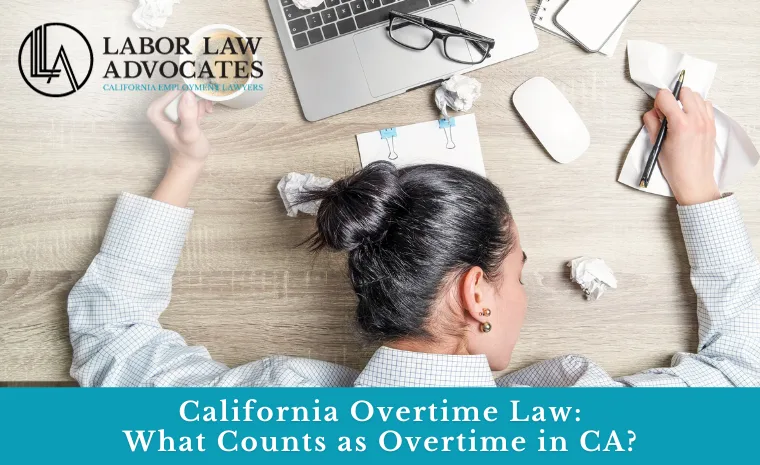In California, where innovation and hard work often go hand in hand, understanding the complexity of labor laws, especially when it comes to overtime. California overtime laws are designed to protect the rights of workers and ensure they are fairly compensated for their extra hours of labor.
In this blog, we will explore all about California overtime law, defining what constitutes overtime, examining any local variations, comparing it with nationwide laws, and offering guidance on filing grievances and the role of an employment lawyer in the process.
How Does Overtime Work in California
Overtime is defined as any work performed by a non-exempt employee in excess of the regular eight hours in a workday or 40-hour workweek. California Labor Code Section 510 states that if an employee works beyond eight hours in a single workday or more than six days in an workweek, they are entitled to receive compensation for overtime at a rate not less than:
- One and a half times their regular rate of pay for all hours worked beyond eight hours, up to and including 12 hours in any workday. This is appropriate to the first 8 hours worked on the 7th consecutive day of the workweek.
- Double their regular rate of pay for all hours worked beyond 12 hours in any workday. This double rate also applies to all hours worked beyond eight on the 7th consecutive day of the workweek.
Do you have unpaid overtime compensation?
Understanding Overtime Calculations
If you receive payment based on an hourly basis, your regular pay rate includes various components, such as shift differentials and the hourly value of any additional non-hourly rate you have. Regular rate should never be lower than California’s declared minimum wage.
For those on a salary, determining the regular rate involves these steps:
- Multiply your monthly salary by 12 to know what you should earn in a year.
- Divide the annual salary by 52 to calculate the weekly salary.
- Further divide the weekly salary by 40 (or the legal maximum regular hours) to establish the regular hourly wage.
If your compensation is based on pieces completed or commissions earned, you can choose one of these methods to determine the regular overtime rate calculations:
- Use the piece or commission rate as the regular rate. Receive one and a half times this rate for production during the first four overtime hours in a workday, and double time for all hours worked beyond 12 in a workday, or
- Divide your total earnings for the workweek, including overtime hours, by the total hours worked during the workweek, encompassing overtime hours. Receive half of the regular pay for hours requiring time and a half for each overtime hour worked and the full rate for hours requiring double time.
Local Variation in California Overtime Law
While California has statewide overtime laws, cities like San Francisco within the state have their own local ordinances that may differ slightly from the state regulations. California Labor Code Section 514 mandates the payment of overtime for hours worked beyond eight (8) in a day. However, this law doesn’t apply to the City of San Francisco due to the coverage of our salaried employees under collective bargaining agreements. Despite this exemption, hourly employees can still receive the benefit.
San Francisco overtime law also has added a provision called Straight-Time Overtime or OST. It is earned when employees work hours outside their regular schedule and have not exceeded 8 hours in a single day or 40 hours in a week.

California vs. Nationwide Overtime Laws
California’s overtime laws have similarities and differences to federal overtime laws.
Daily Overtime Threshold
The Fair Labor Standards Act (FLSA) mandates that employers compensate employees at a rate of one-and-a-half times the regular pay for any hours worked exceeding 40 hours in a workweek.
In California, overtime rate is required to be one-and-a-half times the regular pay for hours worked beyond eight in a workday or over 40 in a workweek. California employers are required to provide double the regular pay rate for hours worked beyond 12 hours in a single day and for all hours worked beyond eight on the seventh consecutive workday.
Refusal to Work Overtime
According to federal law, companies have the authority to terminate or discipline employees who decline to work overtime, provided there is no discriminatory motive behind the decision.
Similarly, in California, an employer is within their rights to discipline or terminate an employee for refusing to work mandatory overtime. However, the California’s Department of Industrial Relations (DIR) states that it is not permissible to take disciplinary action against an employee for refusing to work on the seventh day of the workweek. In such cases, the employer may be liable for penalties preventing an employee from taking a day of rest.
Unauthorized Overtime
According to both California’s wage and hour laws and federal regulations, employers are obligated to provide overtime premium, irrespective of whether the overtime hours were officially authorized. The crucial factor is the hours during which the employee was either “suffered or permitted to work,” indicating work that the employer was aware of or should have been aware of. Nevertheless, employers are permitted to take disciplinary action against employees who breach the company’s policy by working overtime without the necessary authorization.
Filing a Grievance for Overtime Violations
If you believe your employer has violated California’s overtime laws, you may take the following steps:
- Document Hours Worked: Keep accurate records of your work hours per day, including start and end times and breaks taken.
- Consult HR or Management: Discuss your concerns with your employer or HR department to resolve the issue informally.
- File a Complaint: If informal discussions do not lead to a resolution, you can file a complaint with the California Department of Industrial Relations or consult an employment lawyer.
The Role of an Employment Lawyer
Employment lawyers play a crucial role in helping employees navigate California overtime laws. They can:
- Evaluate Your Case: Assess whether your situation qualifies for an overtime claim.
- Negotiate on Your Behalf: Attempt to negotiate a resolution with your employer.
- File a wage claim or lawsuit: If necessary, an employment lawyer can file a lawsuit on your behalf to recover unpaid overtime wages.
- Protect Your Rights: Employment attorneys are well-versed in employment law and can ensure your rights are protected throughout the process.
Do you have unpaid wages after working overtime?
FAQs on California Overtime Rules
Does California have overtime exemptions?
Yes. Several exceptions exist to the standard overtime law outlined earlier. An “exception” denotes that overtime payment for a specific category of employees follows criteria distinct from those previously mentioned. Essentially, an exception represents a unique regulation like healthcare and agricultural workers.
Is a bonus factored into the regular rate of pay for overtime calculations?
Yes, but only if it’s a nondiscretionary bonus. Nondiscretionary bonuses, given for hours worked, production, proficiency, or as an incentive to stay with the same employer, are included in determining the regular rate of pay for overtime. This includes flat sum bonuses. To calculate overtime on a flat sum bonus, divide the bonus by the maximum legal regular hours worked in the bonus-earning period, not the total hours. This gives the normal rate of pay for the bonus, and overtime is then paid at 1.5 or 2 times this rate for overtime hours.
Discretionary bonuses or gifts unrelated to hours per workday, production, or efficiency, like holiday bonuses for good service, are not subject to overtime pay rates and are not included in determining the regular rate of pay.
I worked 8 hours each day from Monday, Tuesday, Thursday, and Friday and then again on Saturday, totaling 48 hours for the week. I was absent due to illness on Wednesday. I received payment for 48 hours at my standard hourly rate for the week. Should I receive eight hours of overtime pay?
No, you are not eligible for overtime pay in this scenario. Overtime calculations are based on actual hours worked, and you only worked 40 hours during a single workweek. Another example where you receive regular wages but the time doesn’t count towards overtime is if you are paid for a holiday without working that day. In such cases, the hours on which holiday pay is calculated are not considered hours worked for overtime purposes because no work was performed.
Do California labor laws apply to independent contractors?
Unfortunately, no. California’s labor regulations, covering aspects like minimum wage, overtime, meal breaks, rest break periods, and workplace safety, safeguard the rights of nonexempt employees but do not extend the same protections to independent contractors. Employees have the option to approach state agencies such as the Labor Commissioner’s Office for the enforcement of these laws. On the other hand, independent contractors must address disputes or assert their rights outlined in contracts through alternative channels.
Protecting Your Rights: Consult with An Employment Attorney
Understanding California overtime laws is essential for both employers and employees to ensure compliance and fair compensation. Keep in mind that local variations may exist, and it’s crucial to document your hours and follow the appropriate steps if you believe your rights have been violated. An employment lawyer can provide valuable guidance and representation in pursuing your overtime claim.
Labor Law Advocates is dedicated to protecting your rights while holding employers accountable for cases of unpaid overtime or unlawful forcing of overtime. Consult with the most qualified employment attorney in California for legal advice today. Speak with one of the experts at Labor Law Advocates for a free consultation. We are available 24/7. Call us anytime at (424)-688-3632.




